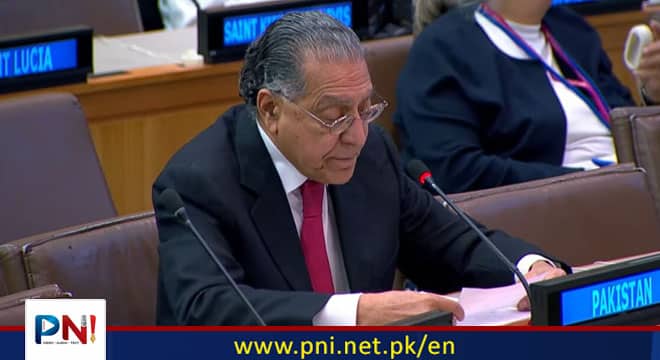UNITED NATIONS, Mar 16 (APP): Speakers at a panel discussion on the impacts of climate change Friday urged the international community to demonstrate a stronger political will to deal with the threats posed by this phenomenon. They said that urgent steps needed to be taken to work out modalities for the mobilization of resources to cater to the growing financial needs for the success of the adaptation and resilience strategy.
The panel discussion on “From Rhetoric to Reality in Building Climate Resilience: Adaptation, Loss and Damage” was hosted by the Permanent Mission of Pakistan to the United Nations in collaboration with the Islamic Relief Worldwide and the UNICEF. The panelists included climate and sustainable development experts, representatives of civil society and international non-governmental organizations, members of the UN-based diplomatic corps and faith-based organizations. They urged the governments to prioritize the welfare of children and women who happen to be most adversely impacted by the climate change events.
In his keynote address, Ambassador Munir Akram, Permanent Representative of Pakistan to the UN, underscored Pakistan’s vulnerability to climate change, despite contributing minimally to global greenhouse gas emissions. He highlighted the severe impact of extreme weather events on Pakistan, including floods, glacial melting, and desertification, emphasizing the urgent need for climate resilience measures. Ambassador Akram commended the collaboration between the Government of Pakistan, the UN, and development partners in developing the Resilient Recovery, Rehabilitation, and Reconstruction Framework (4RF) to address the aftermath of the 2022 floods. He underscored the importance of long-term resilience planning to strengthen Pakistan’s ability to withstand future climate-related challenges. Expressing gratitude for international support, Ambassador Akram emphasized the role of civil society organizations in flood recovery efforts.
He underscored the disproportionate impact of climate change on women and children, citing statistics on increased poverty rates and challenges faced by rural women. Ambassador Akram called for prioritizing women and children in climate finance discussions, highlighting efforts to strengthen the gender responsiveness of climate finance. He raised concerns about the inadequacy of climate finance pledges, particularly the disproportionate reliance on loans, urging developed countries to bear primary responsibility for contributing to climate finance. The Pakistan UN envoy emphasized the pressing need for collective action to address climate change, enhance resilience, and empower women and girls in the face of climate-related challenges. In his remarks, Anwar Khan, President of Islamic Relief (US), threw light on the operations of Islamic Relief around the world, especially in the context of the devastating Pakistan floods in 2022. He said that by the year 2050, the climate-induced shocks would push up to an additional 158 million women and girls into poverty and lead to 236 million more women into hunger.
Khan said that given the evidence, it was important that the governments and the INGOs collaborate more closely to invest in climate adaptation and resilience building development projects to address the threats posed by climate change. Gautum Narasimhan, UNICEF’s Global Lead for Climate, Energy, and Environment, shed light on the dire condition of millions of children who are disproportionately affected by climate change. He said that with over 1 billion children deeply impacted by climate-related disasters, children are grappling with overlapping challenges of disease and distress, exacerbated by inadequate coping mechanisms in their communities. Narasimhan stressed that despite contributing the least to climate change, vulnerable populations bear the brunt of its consequences. Stressing global solidarity, he emphasized the need for concerted efforts to ensure essential social services like water, healthcare, education, and nutrition reach women and girls.
Andrea Kauffman, representing Partnership for Religion and Development and World Vision and International, emphasized the critical importance of climate justice in mitigating the adverse effects of disasters on women and children. She underscored the necessity of addressing not only the basic needs of women and girls but also their holistic requirements, including religious, educational, emotional and financial support. Ms. Kauffman stressed the urgency of implementing policies and practices that safeguard girls and bring justice to vulnerable populations. Raza Hussain Qazi, a climate expert and writer, highlighted the disproportionate impacts of climate change on children and women and urged the need for greater efforts for resource mobilization that he recommended should be in the form of grants rather than loans.
Follow the PNI Facebook page for the latest news and updates.









